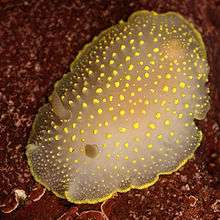Euctenidiacea
The Euctenidiacea, common name dorid nudibranchs, are a taxonomic suborder of sea snails or slugs, marine gastropod molluscs in the order Nudibranchia.[2] Bouchet & Rocroi (2005) rejected the name Anthobranchia on the grounds that it also included Onchidium at the time of original publication. Doridina [3] is equivalent and used in the latest classification.[4]
| Dorid nudibranchs | |
|---|---|
 | |
| Yellow-edge cadlina, Cadlina luteomarginata | |
| Scientific classification | |
| Kingdom: | |
| Phylum: | |
| Class: | |
| Subclass: | |
| Order: | |
| Suborder: | Euctenidiacea Tardy, 1970 |
| Synonyms[1] | |
|
Anthobranchia | |
A morphological phylogenetic study, published in 2000, by Wägele & Willan showed that the subclade Gnathodoridacea (= Bathydoridoidea) and the subclade Doridacea (= Phanerobranchia + Cryptobranchia + Porostomata) each form a monophyletic group.[5]
In a later study, published in 2002, A. Valdés concluded that the superfamilies Doridoidea and Phyllidioidea (called by him Cryptobranchia + Porostomata) formed a clade. He expanded the usage of Cryptobranchia to encompass the whole subclade Doridacea.[6] This move was not followed in the taxonomy of Bouchet and Rocroi.
Taxonomy
clade Gnathodoridacea
- Superfamily Bathydoridoidea
- Family Bathydorididae
clade Doridacea
- Superfamily Doridoidea
- Family Dorididae
- Family Actinocyclidae
- Family Chromodorididae
- Family Discodorididae
- Superfamily Phyllidioidea
- Family Phyllidiidae
- Family Dendrodorididae
- Family Mandeliidae
- Superfamily Onchidoridoidea (= Phanerobranchiata Suctoria)
- Family Akiodorididae
- Family Onchidorididae
- Family Corambidae
- Family Goniodorididae
- Superfamily Polyceroidea (= Phanerobranchiata Non Suctoria)
- Family Polyceridae
- Family Aegiridae - In Bouchet & Rocroi (2005) is incorrect subsequent spelling Aegiretidae.
- Family Gymnodorididae
- Family Hexabranchidae
- Family Okadaiidae
References
- Hallas, Joshua M.; Chichvarkhin, Anton; Gosliner, Terrence M. (2017-10-01). "Aligning evidence: concerns regarding multiple sequence alignments in estimating the phylogeny of the Nudibranchia suborder Doridina". Open Science. 4 (10): 171095. doi:10.1098/rsos.171095. ISSN 2054-5703. PMC 5666284. PMID 29134101.
- Gofas, S. (2014). Euctenidiacea. Accessed through: World Register of Marine Species on 2015-02-12
- MolluscaBase (2019). Doridina. Accessed through: World Register of Marine Species on 2019-02-01.
- Bouchet P., Rocroi J.P., Hausdorf B., Kaim A., Kano Y., Nützel A., Parkhaev P., Schrödl M. & Strong E.E. (2017). Revised classification, nomenclator and typification of gastropod and monoplacophoran families. Malacologia. 61(1-2): 1-526.
- H. Wägele & R.C. Willan (2000). "Phylogeny of the Nudibranchia". Zoological Journal of the Linnean Society. 130 (1): 83–181. doi:10.1111/j.1096-3642.2000.tb02196.x.
- A. Valdés (2002). "A phylogenetic analysis and systematic revision of the cryptobranch dorids (Mollusca, Nudibranchia, Anthobranchia)". Zoological Journal of the Linnean Society. 136 (4): 535–636. doi:10.1046/j.1096-3642.2002.00039.x.
Further reading
- Belick F. P. (1975) "Additional opisthobranch mollusks from Oregon". The Veliger 17(3): 276-277.
- Goddard J. H. r. (1984) "The opisthobranchs of Cape Arago, Oregon, with notes on their biology and a summary of benthic opisthobranchs known from Oregon". The Veliger 27(2): 143-163.
- Lance J. R. (1967) "The holotype of the abyssal dorid nudibranch Bathydoris aoica Marcus & Marcus, 1962". The Veliger 9(4): 410.
- Marcus Ev. & Marcus Er. (1962) "A new species of the Gnathodoridacea". Anais da Academia Brasileira de Ciências 34: 269-275.
- Valdés Á. & Bertsch H. (2000) "Redescription and range extension of Bathydoris aioca Marcus & Marcus, 1962 (Nudibranchia: Gnathodoridoidea)". The Veliger 43(2): 172-178.
External links
| Wikimedia Commons has media related to Euctenidiacea. |